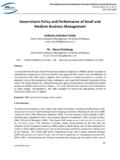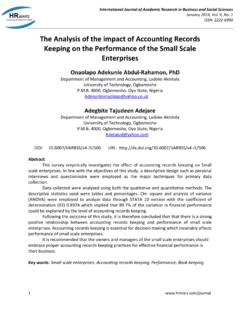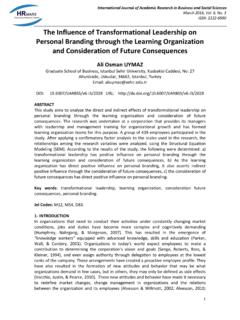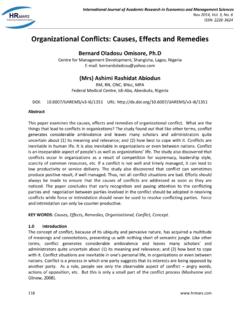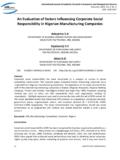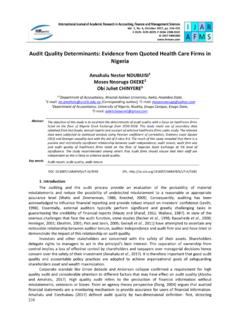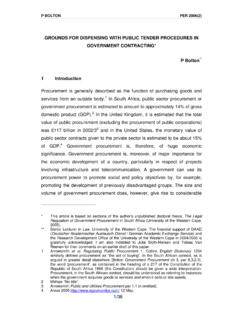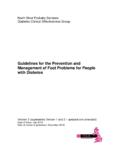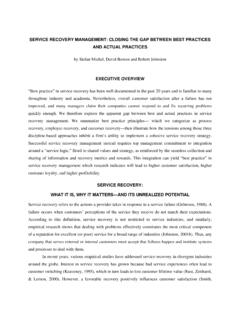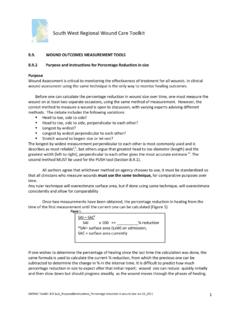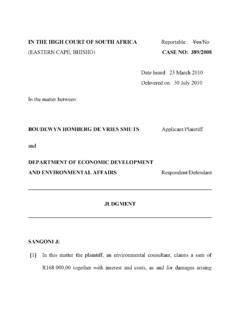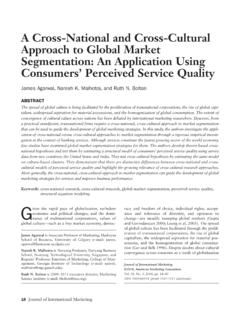Transcription of Entrepreneurial Orientation, Access to Finance and ...
1 International Journal of Academic Research in Business and Social Sciences 2016, Vol. 6, No. 11 ISSN: 2222-6990 692 Entrepreneurial orientation , Access to Finance and Business Performance: A Preliminary Analysis Syamsuriana Sidek, Mohd Rosli Mohamad & Wan Mohd Nazdrol Wan Mohd Nasir Faculty of Entrepreneurship and Business Universiti Malaysia Kelantan, 16100 Kota Bharu, Kelantan, Malaysia DOI: URL: ABSTRACT Small and Medium Enterprises (SMEs) can be a cushion for unstable economic condition. They are believed to be able strengthen the economic development of a country. The statistics shows that they are accounted for more than 95 per cent of enterprises across the world.
2 Acknowledging the importance of various contributions of SMEs business performance to an economy, many studies on internal and external factors affecting business performance including Entrepreneurial orientation and Access to Finance has been done. Business performance, however, requires more than resources. To cope with these situations, they must have enough financial Access in order to Finance their business development. Despite its increasing importance to the economy and individual entrepreneurs, SMEs struggle hard to Access to Finance . Unfortunately, there is limited study to prove that Entrepreneurial orientation would increase Access to Finance and ultimately increase performance.
3 Therefore, the purpose of this study is to test the relationship of Entrepreneurial orientation and Access to Finance on SMEs performance and unearth whether Access to Finance can be a mediator in the relationship between Entrepreneurial orientation and business performance. For start-up, this study employed a primary data set drawn from 30 SMEs and using regression analysis to test all hypotheses. By testing the mediator effect, this study advances the previous works on this area which considers this effect on business performance simultaneously. The main findings indicate that Entrepreneurial orientation and Access to Finance are positively significant on business performance and Entrepreneurial orientation would help business to get Access to capital and hence its performance could be improved.
4 Since this study is preliminary stage, the small sample size was the major limitation of this study which inhibited the comparison of the results between industry sectors. A study of this nature is vitally-important to highlight the stakeholder such as government, private bodies, NGOs, policy maker and entrepreneurs on the important of Entrepreneurial orientation and accessibility to Finance on business performance. KEYWORDS: Entrepreneurial orientation , Access To Finance , Business Performance, Sme, Preliminary Study. International Journal of Academic Research in Business and Social Sciences 2016, Vol.
5 6, No. 11 ISSN: 2222-6990 693 1. INTRODUCTION The contemporary studies in small business normally discuss the issues of business performance in their studies (Steffens et al., 2009). This issue sparked a heated debated not only to business media but policy makers, too (Storey, 2011). However, this area of research still limited in their empirical base (Blackburn & Jarvis, 2010), dependent on normative assumptions (Gibb, 2000) and theoretically weak (Leitch et al., 2010). This topic is need for more empirically robust studies subject to a series of complex factors that determine growth and performance in small business (Levie & Lichtenstein, 2010).
6 Many studies have been done focus on business performance. Factors associated to the performance are also many such as sector activities, firm size, management experiences (Baldwin, 2005; Storey, 2004), customer s satisfaction, government policy (Dobbs & Hamilton, 2007), socio-cultural factors involved in Entrepreneurial activity (Welter & Smallbone 2011), including Entrepreneurial orientation (Bolton & Lane, 2012; Awang et al., 2010) and Access to Finance (Harvie, Oum, & Narjoko, 2011; Mohammed & Obeleagu-nzelibe, 2014). Some studies and empirical evidence show that Entrepreneurial orientation would enhance Access to Finance (see Covin & Lumpkin, 2011; Pandula, 2011; Ghimire & Abo, 2013).
7 Unfortunately, there is limited study to prove that Entrepreneurial orientation would increase Access to Finance and ultimately increase performance. Moreover, Entrepreneurial orientation in some studies had no significant impact on firm performance (Khalil, Nejadhussein & Fazel, 2013). This shows that Entrepreneurial orientation had no direct impact on business performance (see Lumpkin & Dess, 1996; Wiklund & Shepherd, 2005). This might be true for sustain business operation capital is more important. Entrepreneurial orientation would help small business to get Access to capital and hence its performance could be improved.
8 Therefore, the purpose of this study is to test the relationship of Entrepreneurial orientation represented by three main dimensions (innovativeness, risk taking and aggressive competitiveness) on SMEs performance and unearth whether Access to Finance can be a mediator in the relationship between Entrepreneurial orientation and business performance. 2. THEORETICAL FRAMEWORK AND HYPOTHESES DEVELOPMENT Entrepreneurial orientation and Business Performance Performance of an organisation is based on the result from various strategies that are adopted by the organization itself. Harabi (2007) indicated that the principal factors of firm performance are related to business strategies, location, price competitor, company liability, market demand and certain government policies.
9 Prior researchers suggested that financial measure should have a linkage with the market based measures (Dess & Davis, 1984). The suitability of exploring the dimensions of Entrepreneurial orientation multidimensionality or in unidimensionality is a matter of theoretical viewpoint (Covin & Wales, 2012; Covin, Green, & Slevin, 2006). Historically, the model of Entrepreneurial orientation is introduced by Miller (1983) with prior dimension of Entrepreneurial orientation are innovation, risk taking and International Journal of Academic Research in Business and Social Sciences 2016, Vol.
10 6, No. 11 ISSN: 2222-6990 694 pioneering (also known as aggressive competitiveness). Since Entrepreneurial orientation model has been developed since last decades, many studies whether quantitative and qualitative had been done. The significant impact of Entrepreneurial orientation on business performance and growth has been proved by previous researchers. It has been revealed that Entrepreneurial firms, profitability, growth, firm performance and product innovation are closely related each other (see Moreno & Casillas, 2008; Avlonitis & Salavou, 2007). Zampetakis et al.

